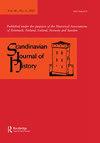从革命戏仿到民主修辞:两次世界大战期间挪威工党内部政治词汇的替代
IF 0.8
3区 历史学
Q1 HISTORY
引用次数: 0
摘要
摘要本文考察了两次世界大战期间挪威工党的政治语言,以揭示其在政治策略和言论上有争议的转变之间的关系。这是通过对工党使用“革命”和“民主”两个概念的定量和定性实证案例研究来实现的。调查结果表明,工党从激进左翼立场向改革主义的转变伴随着其修辞手法的逐渐更替,最显著的是其革命性的模仿被民主修辞所取代。调查结果还表明,向改革主义的发展并不意味着完全赞同既定的民主制度,而是采取了改革主义立场,目的是转变为社会和经济民主制度。在对挪威工党言论的分析中,这篇文章提供了新的见解,有助于解释其策略的变化,这些变化让历史学家非常困惑。从更广泛的角度来看,这篇文章对北欧劳工运动中的挪威例外主义有着微妙的理解。本文章由计算机程序翻译,如有差异,请以英文原文为准。
From revolutionary paroles to democratic rhetoric: replacement of the political vocabulary within the Norwegian Labour Party in the interwar period
ABSTRACT This article examines the Norwegian Labour Party’s political language in the interwar period to uncover the relationship of its contentious shifts in political strategy and rhetoric. This is done through a quantitative and qualitative empirical case study of Labour’s use of the two concepts, ‘revolution’ and ‘democracy’. The findings show that Labour’s change from a radical-left position to reformism was accompanied by gradual replacement of its rhetorical repertoire, most notably in that its revolutionary paroles were superseded by democratic rhetoric. The findings show also that the development towards reformism did not imply full endorsement of the established democratic system, but rather that a reformist stance was adopted with the objective of changing to a system of social and economic democracy. In its analysis of the Norwegian Labour Party’s rhetoric the article provides new insights, which help to explain changes to its strategies that have greatly puzzled historians. From a wider perspective, the article offers a nuanced understanding of Norwegian exceptionalism within the Nordic labour movement.
求助全文
通过发布文献求助,成功后即可免费获取论文全文。
去求助
来源期刊

SCANDINAVIAN JOURNAL OF HISTORY
HISTORY-
CiteScore
1.10
自引率
20.00%
发文量
33
期刊介绍:
Scandinavian Journal of History presents articles on Scandinavian history and review essays surveying themes in recent Scandinavian historical research. It concentrates on perspectives of national historical particularities and important long-term and short-term developments. The editorial policy gives particular priority to Scandinavian topics and to efforts of placing Scandinavian developments into a larger context. Studies explicitly comparing Scandinavian processes and phenomena to those in other parts of the world are therefore regarded as particularly important. In addition to publishing articles and review essays, the journal includes short book reviews. Review essay proposals and polemical communications are welcomed.
 求助内容:
求助内容: 应助结果提醒方式:
应助结果提醒方式:


